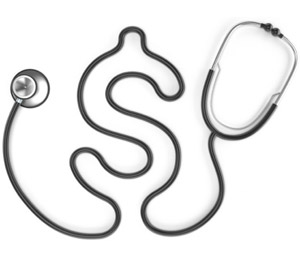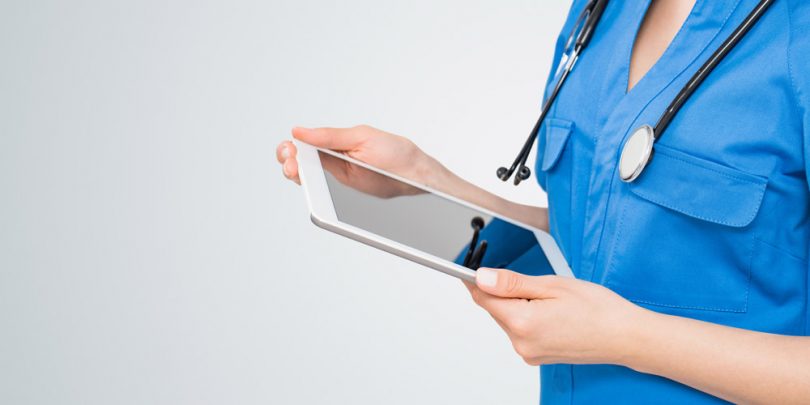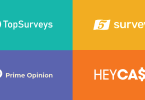Physicians, nurses, physician assistants, medical students, pharmacists, dentists, healthcare executives, and other healthcare professionals are eligible to participate in paid medical studies.
Participating in medical market research can enable this group of professionals to learn about new medical treatments, influence the development of new products and medications, and help improve the healthcare industry while earning lucrative compensation for their efforts.
» Skip ahead to see a list of paid medical survey providers
How it works
![]() The opinions of healthcare workers are highly sought after by drug, device, diagnostic, pharmaceutical, and healthcare IT companies. These companies hire market research companies to conduct studies on their behalf and by contacting the members of the healthcare panels they operate, market researchers can survey people working in medicine.
The opinions of healthcare workers are highly sought after by drug, device, diagnostic, pharmaceutical, and healthcare IT companies. These companies hire market research companies to conduct studies on their behalf and by contacting the members of the healthcare panels they operate, market researchers can survey people working in medicine.
Medical workers have opportunities to participate, most commonly, in online surveys and online focus groups, but also in in-person focus groups, and telephone studies. Interacting with peers online, as well as accessing the final results of surveys can be an added benefit of participating.
Healthcare panels are always seeking new members, and once you join their database of respondents, you will receive e-mails inviting you to complete paid online surveys. Survey emails will state the topic of the study, the time it will take to complete it, as well as the amount of compensation offered. Participating is an easy way for medical students, residents, nurses and doctors to make money online.
Receive research studies relevant to your area of expertise and complete them as often as you please. There is no obligation for participation and you may unsubscribe at any time.
Earning potential
 Paid physician studies can be very lucrative, and generally offer compensation ranging from $50-$1200+ per study. As physicians represent a very small segment of the population and are typically short on time, when a market research company is hired to conduct a study which surveys the group, they know it may be difficult to recruit participants for the study.
Paid physician studies can be very lucrative, and generally offer compensation ranging from $50-$1200+ per study. As physicians represent a very small segment of the population and are typically short on time, when a market research company is hired to conduct a study which surveys the group, they know it may be difficult to recruit participants for the study.
One way to garner the attention of physicians is by offering generous compensation. Compensation amounts vary depending on the length, complexity and qualification criteria of a survey, but is usually substantial.
If a study is multi-part, a continuation of a previous study, or is aimed at a very specific group (such as sub-specialists or those with many years of experience), the more lucrative it may be. Payments are usually issued in the form of a payment check that is sent in the mail, or by a PayPal payment. Occasionally, Amazon gift cards may also be offered.
Nurses, pharmacists, and other healthcare workers are also eligible to take part in medical surveys. Although they may not be as generously compensated as specialists, when compared to general consumer surveys (which anyone can apply to join), payment amounts are much higher.
Who can participate
Most medical professionals can participate in paid medical studies. Physicians, nurses, medical assistants, medical students, midwives, dentists, and veterinarians are all eligible to contribute their opinions.
Healthcare workers such as chiropractors, physiotherapists, massage therapists, occupational therapists, podiatrists, etc. may also participate, depending on a survey panel’s requirements.
Participation requirements
 When a healthcare professional first registers with a medical market research company, the panel needs to verify that the person does indeed work in healthcare. Although it’s not a difficult process to prove you work in medicine (sometimes providing just the name of your medical school and graduation year is all that’s required), you will most typically be asked to provide a medical license number.
When a healthcare professional first registers with a medical market research company, the panel needs to verify that the person does indeed work in healthcare. Although it’s not a difficult process to prove you work in medicine (sometimes providing just the name of your medical school and graduation year is all that’s required), you will most typically be asked to provide a medical license number.
USA physicians
![]() If you’re a doctor in the USA and would like to participate in paid surveys, you may be asked to provide your 10-digit National Provider Identifier number. Your NPI number may be matched to your full name (which you’ll need to provide when you sign up), in order to verify your identity.
If you’re a doctor in the USA and would like to participate in paid surveys, you may be asked to provide your 10-digit National Provider Identifier number. Your NPI number may be matched to your full name (which you’ll need to provide when you sign up), in order to verify your identity.
Otherwise, you may also provide your medical license number as an alternative way to verify your status as a practicing physician. Remember to state your specialty or sub-specialty in order to receive the most relevant (and potentially, the most lucrative) surveys possible.
Other USA medical professionals
If you’re a pharmacist, nurse practitioner, dentist, physical therapist, etc., you will likely have an NPI number which you can supply to a healthcare panel. If you don’t have one, you may also supply your license number from your governing board (NCSBN ID, NABP number, etc.)
Canadian physicians
![]() If you’re an MD in Canada looking for paid medical studies, you will be asked to provide your license number. Most physicians provide their provincial college number which the market research company can then cross-reference and match to your full name (a requirement for issuing payment).
If you’re an MD in Canada looking for paid medical studies, you will be asked to provide your license number. Most physicians provide their provincial college number which the market research company can then cross-reference and match to your full name (a requirement for issuing payment).
If you’re a resident doctor, you may still be eligible to participate with most survey programs, as you will have a college number. If you’re still a medical student, you can still sign up to take medical surveys, though you might need to first pass your college exams to start receiving high paying studies.
Other Canadian medical professionals
Whether you’re a RN, pharmacist, massage therapist, physiotherapist, etc. you will have a registration number with your governing college. You will likely need to provide this number to a medical market research company before being eligible to take their paid surveys.
UK physicians
![]() Physicians in the UK will most commonly be asked to provide their 7-digit GMC (General Medical Council) number when they first apply to join a healthcare panel. You may also be asked to state your specialty (if applicable), as this will enable you to receive targeted surveys most relevant to your area of expertise.
Physicians in the UK will most commonly be asked to provide their 7-digit GMC (General Medical Council) number when they first apply to join a healthcare panel. You may also be asked to state your specialty (if applicable), as this will enable you to receive targeted surveys most relevant to your area of expertise.
Other UK medical professionals
If you are not a physician, you will still have a council number (whether from the NMC, etc.) which identifies you as a medical professional. You will usually be asked to provide this number when applying for medical surveys, so that your status as a healthcare worker can be verified.
Other countries
Countries around the world each have their own institutions for managing medical workers. Be it governing colleges, councils, or other establishments, providing your professional registration number from such organizations is usually a requirement when registering to take medical surveys. Providing your medical license number, which will help identify you as a medical professional in your country, is a common requirement.
Your privacy is protected
When a market research company conducts a study, the results of the survey are provided to the client and does not contain any personally identifiable information. Personal information of panel members is not sold to 3rd parties (though you can always peruse a survey company’s Terms of Service to be sure), and most healthcare panels are members of professional market research organizations which set out strict guidelines on how the personal information of respondents is handled.
Companies who offer paid medical studies:
- All Global Circle
- Brand Institute
- Epocrates Honors Program
- eRewards Medical Market Research
- Focus Group Health by Schlesinger
- HAB Central
- InCrowd
- Medefield
- Medical Advisory Board
- MedPanel
- MNOW
- My Medical Panel
- Olson Research Group
- Opinion Site Healthcare Provider Community
- Physicians Advisory Council
- Medical Decision Makers
- Reckner Healthcare Surveys
- SERMO
- The Science Advisory Board
- Truth on Call
- Zoom RX
Tips on earning more
- You will typically receive more surveys if you fully complete your profile with a survey panel. A “profiler” is essentially a short survey (or a series of short surveys) which the market research company can use to better match you to studies more relevant to your area of practice. Not only can completing this help increase the number of surveys you receive, but it can also help reduce the number of disqualifications (attempting to complete a survey, but ultimately not being eligible to do so) you encounter.
- Once you have participated in a few paid surveys and have cashed out your rewards, some survey companies will change the status of your membership to “preferred”. This means that you may receive more surveys, and/or that you will be able to cash out your rewards sooner.
- Log into your survey panel account to check for studies. Not all studies are e-mailed, and if they are, they are often posted online first. If you wish to be first in line for the most lucrative studies, it’s best to regularly check your account online, rather than waiting to be contacted.
- If you are sub-specialist, ensure that you state this somewhere (either during registration or in your profile); sub-specialists can often earn even more per survey than general practitioners.
- Answer all surveys thoughtfully and with care. If you are given the opportunity to type in your answers during a survey, being detailed will keep your account in good standing.
- Some survey panels aimed at physicians and other medical professionals offer referral bonuses for referring colleagues to the panel. If you’ve had a good experience completing studies for a survey website and a referral link is available in your account with the website, consider sharing it with trusted fellow physicians and nurses to receive what’s typically a pretty generous credit to your account.








I am a subspecialst neurologist and I have been doing online surveys for 18 years. The above list is accurate but I already subscribe to all of them. I noticed recently a downturn in the number of surveys e-mailed to me. Usually I expect 3 to 4 surveys a day and now I barely get one a week. I know survey companies consolidate all the time and this decreases the number of surveys I get, but is there another reason for the sudden drop in surveys?
Hi Timothy,
Seasons can have an impact on online survey availability. At the end of the year for instance (November – December), budgets are often fulfilled and as the holiday season approaches, fewer studies tend to be available. This then reverses in January, where survey inventory is typically very high.
Otherwise, the decrease you’re experiencing could be related to being a ‘veteran’ survey taker across multiple panels; your panelist ‘fingerprint’ could be shared across platforms, and because you’re so active, companies might be looking for responses from physicians new to the survey space.
You might want to reach out to a few of the panels directly, asking why the number of survey invitations you’ve received has slowed. Especially for smaller, specialized panels (like ones aimed at physicians), we expect you’d receive a personalized response (versus a canned one). We’d also love to hear what they have to say about your situation.
My name is Michelle. I am a nurse with 40 experience. Gastroenterology is my specialty for the past 20. I would love to take part in paid online surveys,
Hi Michelle,
There are dozens of survey panels who would love to get your opinions as an experienced nurse practitioner. You can access a list of survey panels who offer medical surveys at the bottom of the post above, here: https://www.surveypolice.com/blog/paid-surveys-for-doctors-and-medical-professionals/#list
Great information. Thanks for publishing it. By Gregg L. Friedman MD
I am a physician from punjab India with experience of 30 years. I would love to be part of paid online surveys.